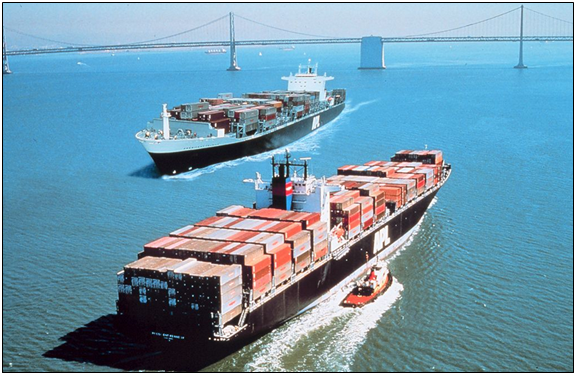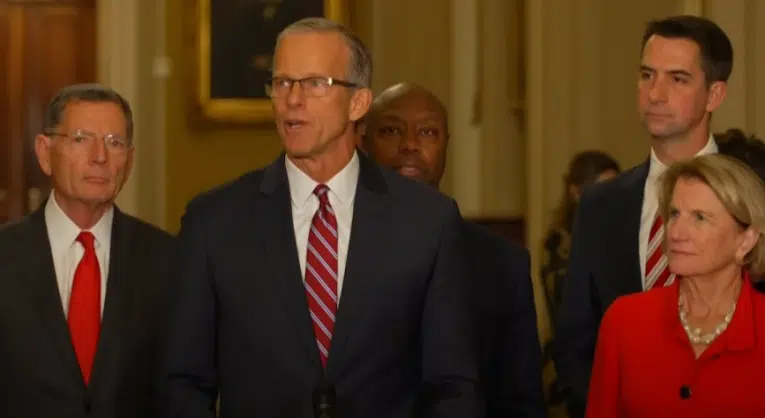By Rick Manning
An international regulation coming out of the United Nations International Maritime Organization (IMO) would both significantly lower pollution levels being generated by the container shipping industry while also benefitting the U.S. oil refining industry and those who work in it.
It is no secret that America’s dismantling of our industrial sector has often times been little more than a transfer of environmental risk from the United States overseas. Foreign countries, like China, with little to no environmental regulations have attracted manufacturers who can no longer afford to compete in the highly regulated U.S., costing our nation jobs and economic wealth. Even with President Trump pushing hard for a better trade deal with China, the trade deficit climbed 17 percent from 2017 to $323 billion last year.
One obvious result of being reliant on overseas markets for the production of goods is that most of those goods are delivered across vast oceans through container and cargo ships. However, it is often lost that there is an enormous environmental cost to these container ships themselves which burn a high sulfur content fuel consisting of an oil refinery sludge known as bunker oil.
Why does this matter?
It is estimated that just sixteen of the largest container ships create more sulfur dioxide air pollution than the 80 million cars that exist in the world — all the while following current International Marine Organization rules. To put the enormity of this into perspective, the three largest shipping alliances in the world have a total of more than 750 container ships under flag, each spewing sulfur dioxide equivalents of a million or more cars into the air.
There is no secret that exporting U.S. factories overseas to China has effectively increased the environmental costs of production for every day goods, but it is stunning that simply transporting those goods around the world is so toxic.
At a time when the Democrat Party agenda has been focused upon ending the internal combustion engine, domestic airline travel and carbon-based electricity generation here in America shifting even more production to heavy polluter countries, it is incredible that a simple regulation on sulfur content in container ship fuel known as IMO 2020 could have such a major positive impact on the world’s air quality.
And here is the amazing part, the engines in the cargo ships are already able to accommodate the upgraded quality fuel, so there are limited conversion costs. While the estimated fuel costs for the container ships will increase by 30 percent, that increase will actually help price in a small part of the environmental costs of overseas manufacturing, putting domestic manufacturers on a slightly more level playing fieldEven better is that international oil industry experts like Torbjorn Tornqvist, CEO at trading house Gunvor have been quoted by Reuters saying, “The big winner in the IMO is actually the United States. They have the most advanced refining system in the world and will take advantage of importing more heavy crude oil and they will export light crude oil that will get a bigger premium.”
That’s right, America’s energy dominance actually is positioning our nation to be economic winners as this regulation goes into effect.
Already a refinery in Louisiana is being expanded to meet the anticipated need to handle the demand, and it can be expected that IMO 2020 will provide a boon for the domestic refining industry and the thousands of jobs it creates.
Not surprisingly, President Trump led U.S. policies that have moved America toward energy dominance have unforeseen dividends as the world moves toward cleaner burning fuel blends. The resulting investments by U.S. companies to meet the needs of increased domestic energy production will now pay massive dividends in newly created good paying, blue collar jobs as the U.S. becomes one of the major refiners in the world for the new, lower sulfur blend of container ship fuels.
Given the current wave of green socialism that would shut down the United States’ clean, efficient manufacturing economy and transfer the pollution risk to nation’s with abysmal environmental records, it would be wise for our nation’s policy makers to instead embrace the January 1, 2020 IMO fuel regulation by urging that they not be delayed.
The IMO 2020 regulations are a common-sense solution, rather than a pie in the sky socialist dream, which make major strides in cleaning up the world’s air quality without destroying the U.S. economic system that has lifted more people out of poverty worldwide than any other nation in history. And that is a win-win for the world and America.
The author is President of Americans for Limited Government.







